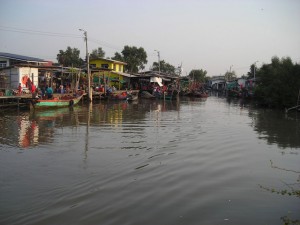A coastal fishing village in Rural Thailand is being submerged by the rising seas, according to a haunting feature in Al Jazeera last week published as an exclamation point to the climate change negotiations in Paris.

Samut Chin, the fishing village, is located about 50 km. south of Bangkok on the coast of the Gulf of Thailand in Samut Prakan province. It is relatively near the capital but in terms of its natural environment it is a world away, for it is literally being swallowed up by the waves. The sea has penetrated about a kilometer farther inland than it was not long ago.
Other human activities such as the destruction of the mangroves and the damning of rivers have harmed the environment, but the rising sea level is taking an especially hard toll on the people. According to Al Jazeera, the villagers are losing their lands at a rapid rate. Unlike the investments of financial investors, who sometimes hold options on stocks that have become worthless and are said to be “underwater,” many families in Samut Chin have deeds to very real properties that are quite literally “under water.”
The reporter, Jack Picone, spoke with the head of the village, Samorn Khengsamut, a middle-aged woman who exuded a lot of energy. She said that the community has been dealing with the rising sea level for 30 years, and they have had to move to higher ground. She told him that they worry they’ll soon run out of higher lands to move to. They’ve erected temporary seawalls out of concrete and bamboo, but all they do is slow down the destruction.
The advancing sea has inundated the village school—all that remains of it is a concrete block visible in the waves. Only the Buddhist temple, the symbolic heart of the village, remains, now located on a small island that the monks persist in fortifying with ever-higher breakwaters against the Gulf of Thailand.
Mr. Picone talked with the monks at the temple who indicated that the local people have not been told what is really happening. Storms raise the waves, so in response the monks have been raising the floor in the temple—almost two meters, in fact, so they can continue to pray safely.
The journalist reviews the discussions of climate scientists, most of whom agree on the basics of climate change. And of course the diplomats in Paris have negotiated global measures to cut back on the anthropogenic causes of the warming earth. But the front line of the issue is not in Paris—it’s on the Gulf of Thailand. The residents of the once-prosperous, but increasingly impoverished village, don’t have the luxury of debating global climate change, much less getting involved in the politics of combating it. They have to deal with it on a day to day basis as best they can, trying to cope with each centimeter of rising water.
The village leader, Samorn Khengsamut, concludes, “It’s very frightening and stressful.”